Structured data for SEO & winning Rich Snippets
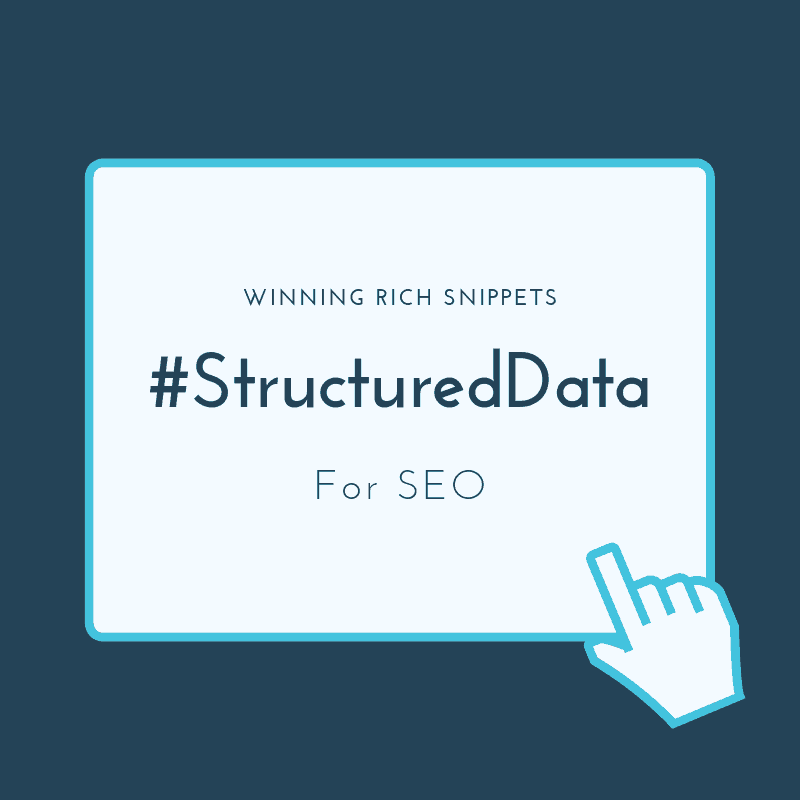
Learning structured data for SEO requires understanding the essence of its very presence which directly relates to the fact “that machines work with strings, not things”. And the way web machines are evolving the need to understand things instead of strings becomes the biggest challenge.
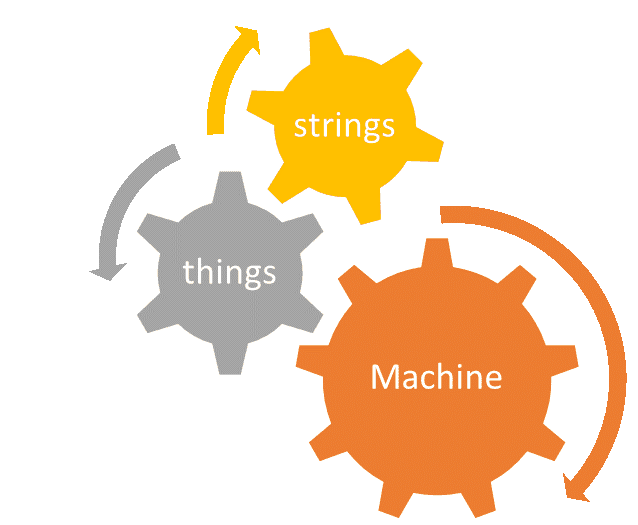
Let’s understand the logic,
Consider a sentence ‘Tigerlivesincorbett’ the one who speaks English can easily understand the sequence of words as a tiger is a ferocious animal and inhabits in a place name Corbett which many of us don’t know where exists, although we can easily classify Corbett is the name of a place somewhere.
Those who know the place already they quite understand that Corbett is a tiger reserve in north India and famous for wild tigers.

Above is what a human understands;
let’s decipher how a search engine bot will decode the same sentence?
Search bots will save 19 alphabets in memory and look for further information. Search bots are not smart enough to understand things are associated with strings unless we are explicitly defining a vocabulary along with a set of rules which helps search bots understand and correlate those characters with meaningful things.
And typically we call that vocabulary with the specific and established rule set as ‘Structured Data.’

We cannot imagine the web & the search smarter without the presence of structured data markup, why?
When someone searches for ‘Tigerlivesincorbett’ search bot will return the result with a web page where the same term exist, however, if search appears ‘where do tigers live’ search bot is not able-enough to return the exact page even though they keep the answer in their memory.
We cannot imagine the web & the search smarter without the presence of structured data markup, why?
Search bot without structured data vocabulary?
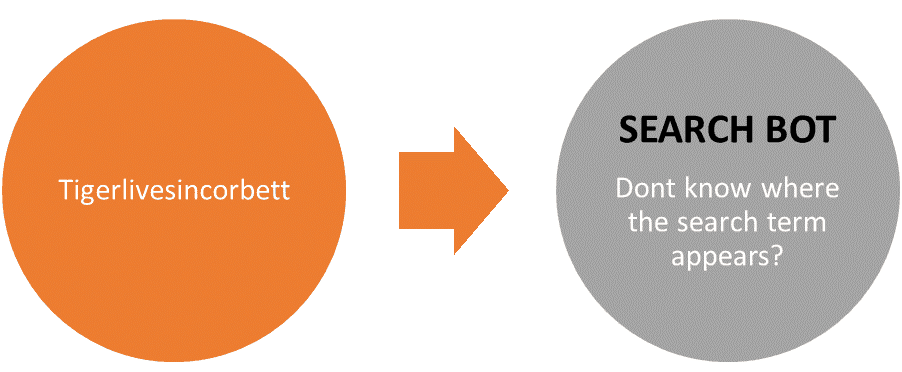
In the absence of vocabulary, or should we say precisely the available structured data, both the web and the search couldn’t have been smarter.
Semantic web and search
Semantic is the study of meaning in a given language, specifically the study relates with the relationship between the signifiers (words, phrases & symbols) in a language and the concept is evolving since 1998.
It’s a cumulative effort of Google, Bing, Yahoo, and Yandex
With the help of semantic, web understands the correlation, importance & significance between things and strings. The concepts and relationship that signifies the importance of words with each other.
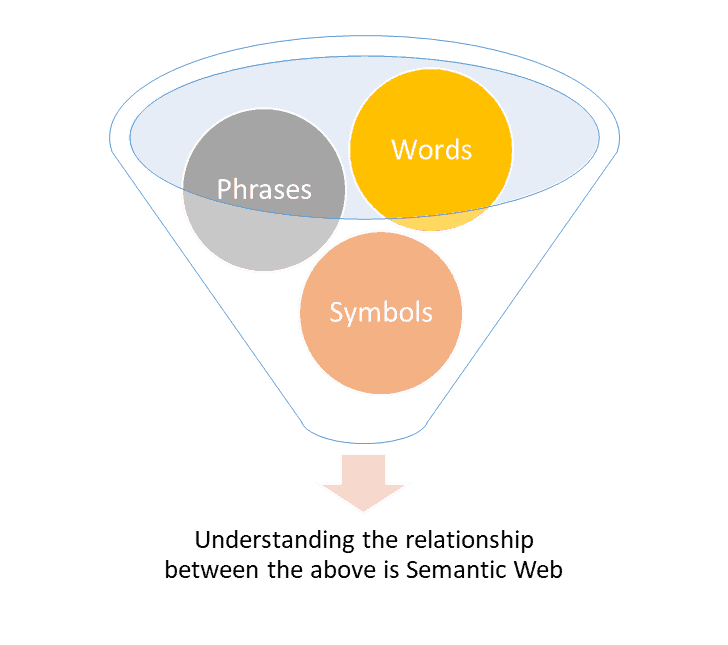
Semantic web search uses vocabulary and grammar both like humans do. And with the help of semantics, search bots understand the real relation between words & phrases,
Example with a Rich Snippet.
Let’s perform a search for ‘Mayor of London’ search engine bot can now easily understand you are looking for ‘Sadiq Khan’ and vice versa as well, although countless names associated with ‘Sadiq Khan’ are available.
Search engines results will show a rich snippet with the name ‘Sadiq Khan’ which you can see includes a picture, news appearances and other details. Thanks to the structured data without which a rich snippet result couldn’t have been possible.
The result with a rich snippet will not only help you avoid the extra clicks and page browsing but also showing you the desired information within a fraction of a second.
If you doubt you can open google.co.uk and perform a search, thanks to semantic web search which couldn’t have been possible without the meaningful or structured data.
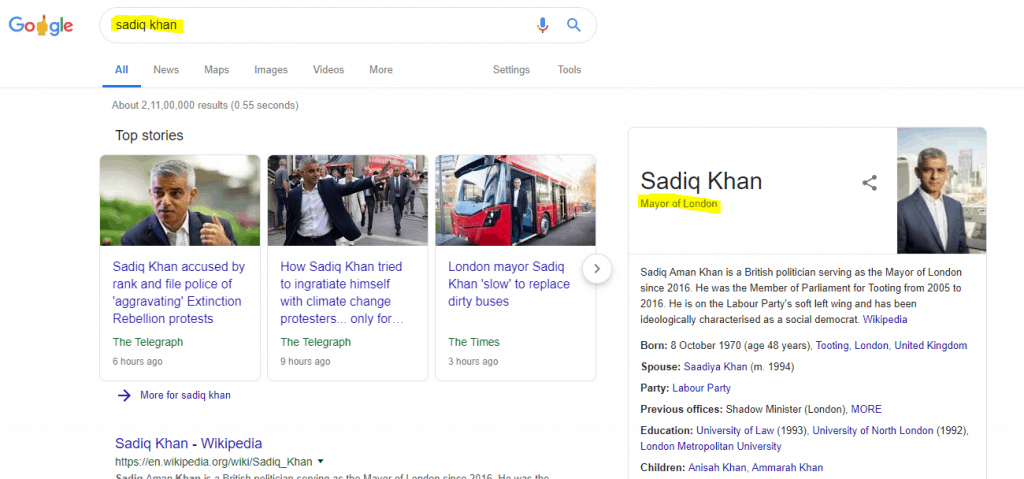
Why is structured data markup essential for your web pages?
A rich snippet in search appearance is only possible when you are using a perfect schema markup in conjunction with page elements like content, images, links etc. PA & DA both play an essential role as well in achieving a rich snippet.
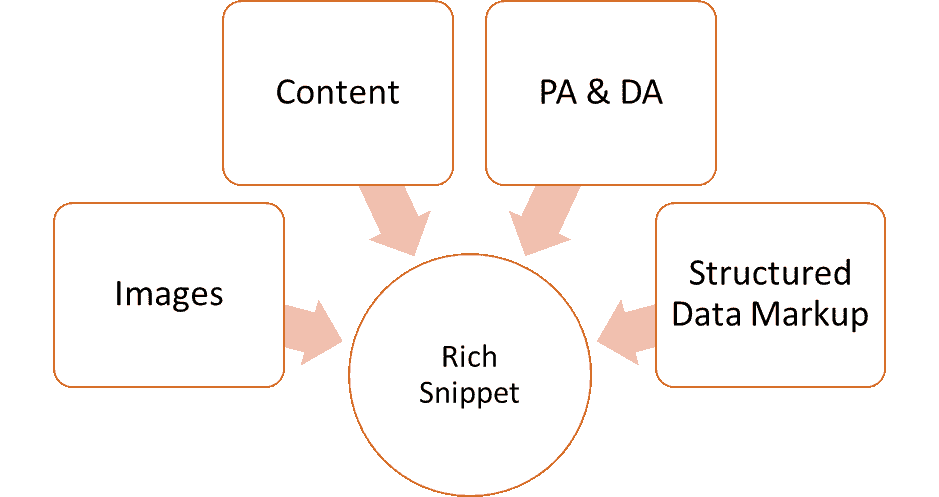
Search engines are smarter than ever and at the same time powerful enough to decipher human queries and return the exact result.
And it is incumbent upon us to reap those benefits only if we understand and empower our digital assets with the vocabulary search bots loves.
Search engines like Google gives edge to those web pages using structured data markup and consider to display the content of their web pages in the form of rich snippets, and that helps the user to avoid further searches and clicks, See the example below.
In return web pages enjoys approx… 30% higher CTR (Click through rate) as compared with their immediate competitors.
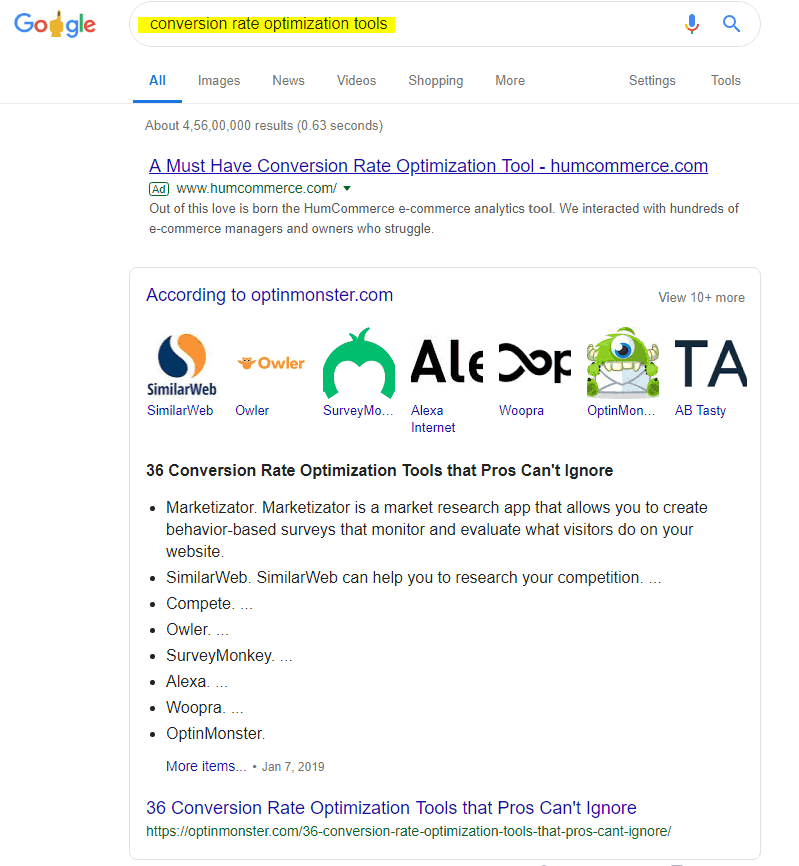
Google says:
What is a schema, Microdata, Microformats, RDFa?
Our digital gurus are not unanimous which results in emanating of different vocabularies & grammar, and thus different formats are born.
In a most basic sense, information is conveyed through a language, whether machine or human, in both the languages two things are primary
- Vocabulary (set of words)
- Grammar (set of rules to use the vocabulary)

Example of vocabulary for structured data markup for SEO
- Person: a person (alive or dead) described through the following properties
- FamilyName: the family name of the person
- GivenName: the first or given name
- BirthDate: date of birth of the person
- Gender: Male/Female/transgender
We also require grammatical rules so that search bots can interpret and understands the data correctly. Example
- Enclose curly braces
- Separate the value and its properties using a colon and enclose them in double quotes
- Separate the value using commas
Structured data markup example code

Keeping in mind the above we can classify digital jargons as follows.
| Vocabulary | Grammar |
| Schema | Microdata |
| DCMI | JSON-LD |
| FOAF | RDFa |
| Microformats | Microformats |
Microformats is the only one to provide both vocabulary & grammar.
What is the best combination of structured data for SEO?
Google suggests using Schema as a vocabulary with JSON-LD (JavaScript Object Notation for Linked Data) as grammar. However, it supports microdata as well.

Major search engines like Google, Bing, Yahoo, Yandex supports schema markup.
Example of a JSON-LD grammar used with schema to generate structured data for a local business page.
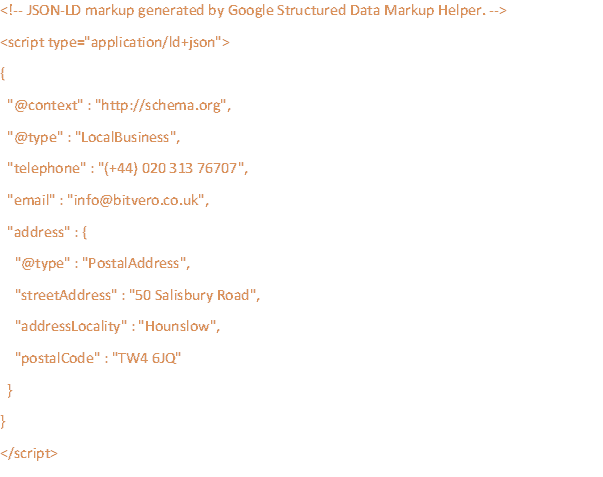
Implementation of structured data mark up for SEO on your web page
Implementation of structured data mark up for SEO on your web page You can check schema for common and popular markups; however, Google also provides a markup helper tool to generate structured data for SEO for any given web page in just three easy steps.
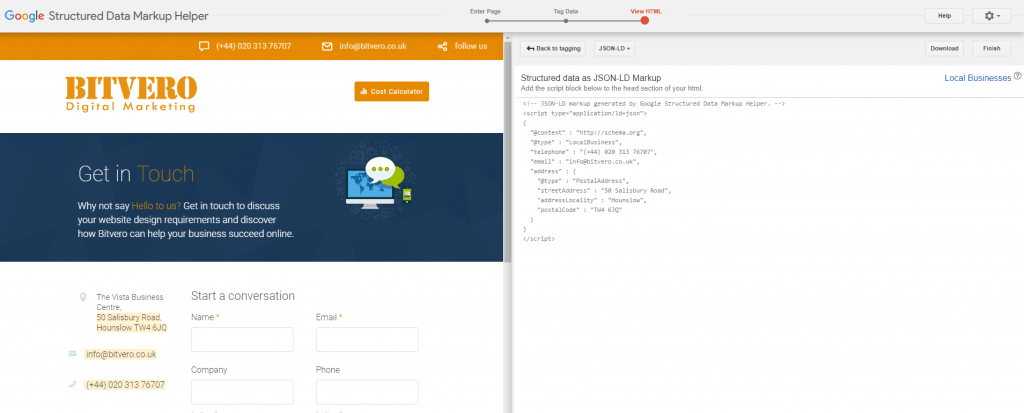
Time to test the schema using the Google structured data testing tool. The tool will show the used structured mark up along with errors if any.
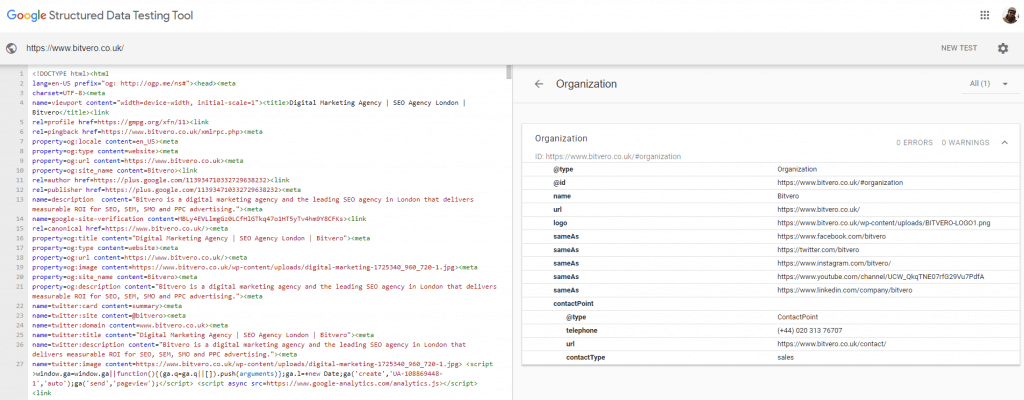
Google will show the rich snippets of your web page in search results only after re-indexing. Although it’s no guarantee that Google will show the same even after indexing. The common reasons are
- You are hiding schema markup from the user
- Marked-up content is misleading to the user
- You have indexed incorrect markup
And in worst cases, you may face Google penalties which you can only observe in Google search console
If your website is using WordPress CMS, the plethora of plugins are available, free and paid both. Perhaps not all of them are viable. However we have observed Schema – All in One Schema Rich Snippets with 90k active installs, doing regular updates and available free, although they are not supporting all the schema types. E.g. service schema, webpage schema. Etc.
Word press Structured data plugin
The paid one is WP-Schema and cost $249 for a lifetime purchase. The plugin includes all significant schema tags except few like webpages.
Winning a Rich Snippet
Achieving a rich snippet is certainly possible yet challenging; Google will never award you a rich snippet without the assurance of establishing a proving authority over your competitor.

A 360-degree criterion is essential to winning the required trust of a search bot, and they are quite smarter after the presence of an established vocabulary through which they can very well understand and determine smallest part of your digital assets in conjunction with their meaning.
Criteria to win a rich snippet lies with the very fact of an established authority of any given web page.
You can earn the authority for your digital asset through all the hard work and by taking a strategic approach.
Even though Google clearly says that the display of rich snippets is not guaranteed, a simple blue link can be more powerful and enough to replace your rich snippet result.
Elements to win a rich snippet in search results
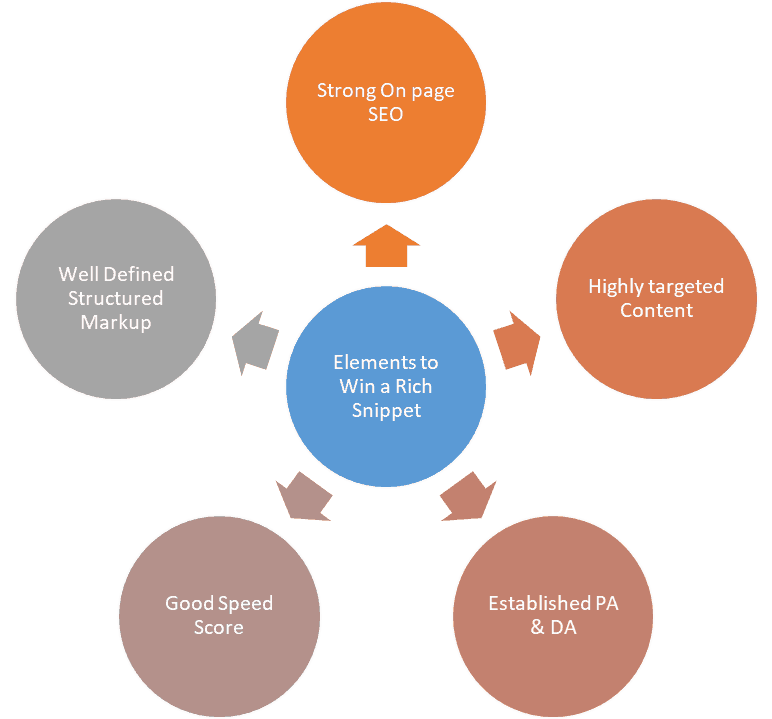
On-page SEO is an essential part of digital marketing and serves as a foundation to build a robust online presence.
Content is the heart and soul of digital assets as well as digital marketing campaigns, and a successful content marketing strategy is vital to the success of your online assets.
PA & DA are page and domain authority respectively, in below fig. if we consider alphabets as digital assets then try to answer which one ranks higher and why?
Answer: C will rank higher even though receiving a single link from B which is an established and authority link because other digital assets are keeping a relation with B and hence accepting the authority of B. and B then passes the same jurisdiction to C.
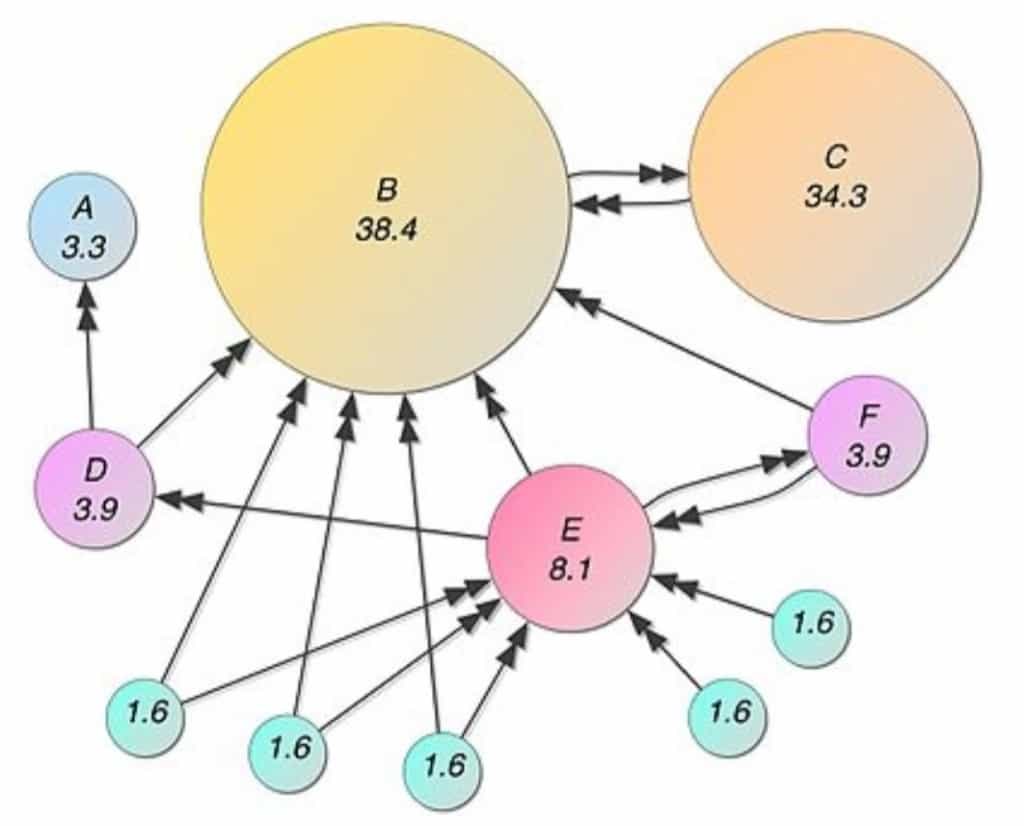
Consider a redesign of your website should you wish to seriously apt Speed score, which is something we cannot overlook especially after July 2018 update from Google in which they said, speed will be a ranking factor for mobile searches.
Common Mistakes using structured data for SEO
Schema of a webpage
We often link our webpages as articles by accepting the webpage schema doesn’t exist. Which exist and you can find the same in things > creative work > webpage with a whole lot of properties available.

Structured data using plugins
Install the plugin and get, set & go. We sometimes wholly ignored the purpose of installing the plugin and forgot to test the structured data; we can use the Google structured data testing tool for the same and avoid common mistakes and errors.
The purpose is to define the webpage thoroughly and is readable and crawlable for search engines so that they can index them with meaningful data.
You will find a whole lot of plugins available, free and paid both.
Defining the Webpage
Using the wrong vocabulary or markup on the webpage can damage the reputation and SERP (search engine results page). Make sure to determine the page as accurate. You can use Google markup helper to structured data markup and generate a code which you can use in HTML websites not using WordPress CMS.
E.g. A website selling cakes and setting the structured markup using recipe tags. A travel website is showing a 7-day cruise trip and using the structured markup of an event. The page is about the recipe of a ‘Pudding’ and defining the structured markup of a ‘Cupcake’.
It is recommended to use a plugin to markup structured data in WordPress websites.
Using hidden content
Markup should not be used to a content hidden from the user as it creates a deceiving search experience. Google never considers a misleading content, and in worst cases, you may end up slammed with a Google penalty as well.
Main Webpage content
Structured data markup should describe the given material of the webpage. One should not create a blank page for the sake of holding structured data. E.g. a webpage is explaining the process of a website design should not describe its structured data with ‘website design templates’.
Avoiding to find out how google see your webpages
It is not necessary that search bots see your webpage exactly as it appears for you in a desktop or mobile. E.g. search engine bots require SEO friendly images, and they may appear blank for a search bot. No matter you can see all of them.
You can check the Google URL inspection tool in search console to catch technical errors.
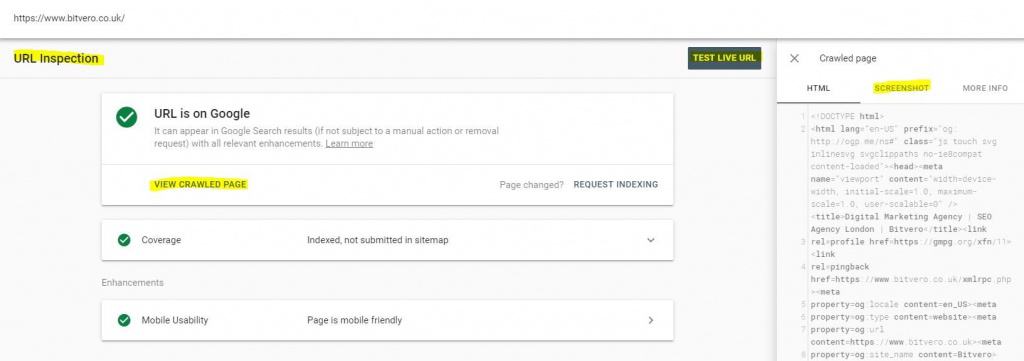
Relevant structured data markup (Schema tags)
Structured data for a local business
When someone searches for a local business, e.g. a barber shop or a Spanish restaurant, search engine displays result with a knowledge graph card with details, but only for those webpages keeping a well-defined map of structured data and by following all the guidelines prescribed by Google.
Live example of a Spanish restaurant with Markup
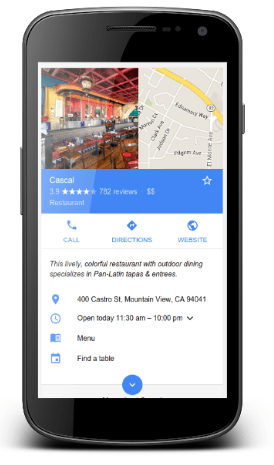
You can also check the relevant schema for local business
Showing properties from organisation and places both.
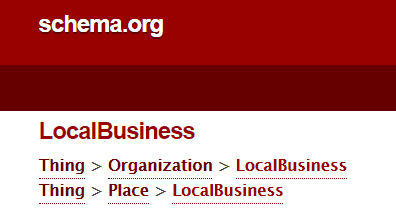
More specific schema markups are also available in Local business schema you can check and use the most relevant for your website pages.
Local business schema categories
- AnimalShelter
- ArchiveOrganization
- AutomotiveBusiness
- ChildCare
- Dentist
- DryCleaningOrLaundry
- EmergencyService
- EmploymentAgency
- EntertainmentBusiness
- FinancialService
- FoodEstablishment
- GovernmentOffice
- HealthAndBeautyBusiness
- HomeAndConstructionBusiness
- InternetCafe
- LegalService
- Library
- LodgingBusiness
- MedicalBusiness
- ProfessionalService
- RadioStation
- RealEstateAgent
- RecyclingCenter
- SelfStorage
- ShoppingCenter
- SportsActivityLocation
- Store
- TelevisionStation
- TouristInformationCenter
- TravelAgency
Structured data schema for webpage
Every webpage is unique, although any given webpage consists of several implicit properties to be found such as page body, vital links, main content, primary image etc.
Webpage schema markup is available under creative work category.

More specific types of webpage schema markup are also available, make sure to use and define them in your pages, may I reiterate if you are using WordPress CMS, you need a plugin to implement & define schema markup.
Webpage schema markup types.
- AboutPage
- CheckoutPage
- CollectionPage
- ContactPage
- FAQPage
- ItemPage
- MedicalWebPage
- ProfilePage
- QApage
- SearchResultsPage
Likewise, other important schema markup tags are also available such as
You can use them as needed.
Wrap UP
Structured data for SEO works well in conjunction with the scope of the main content of the webpage. Just make sure to avoid all common mistakes as mentioned above. Google structured data markup testing tool and helper both are brilliant, and you can use URL inspection tool in search console to check how search bot sees your webpages.
Achieving a ‘Rich Snippet’ result can be challenging. However, results are rewarding, especially a notable 30% increment in CTR may prove to be a game changer in terms of business figures.
Keep searching & innovating because growth is life.
I will look forward to your comments.
Keep smiling & stay happy.

